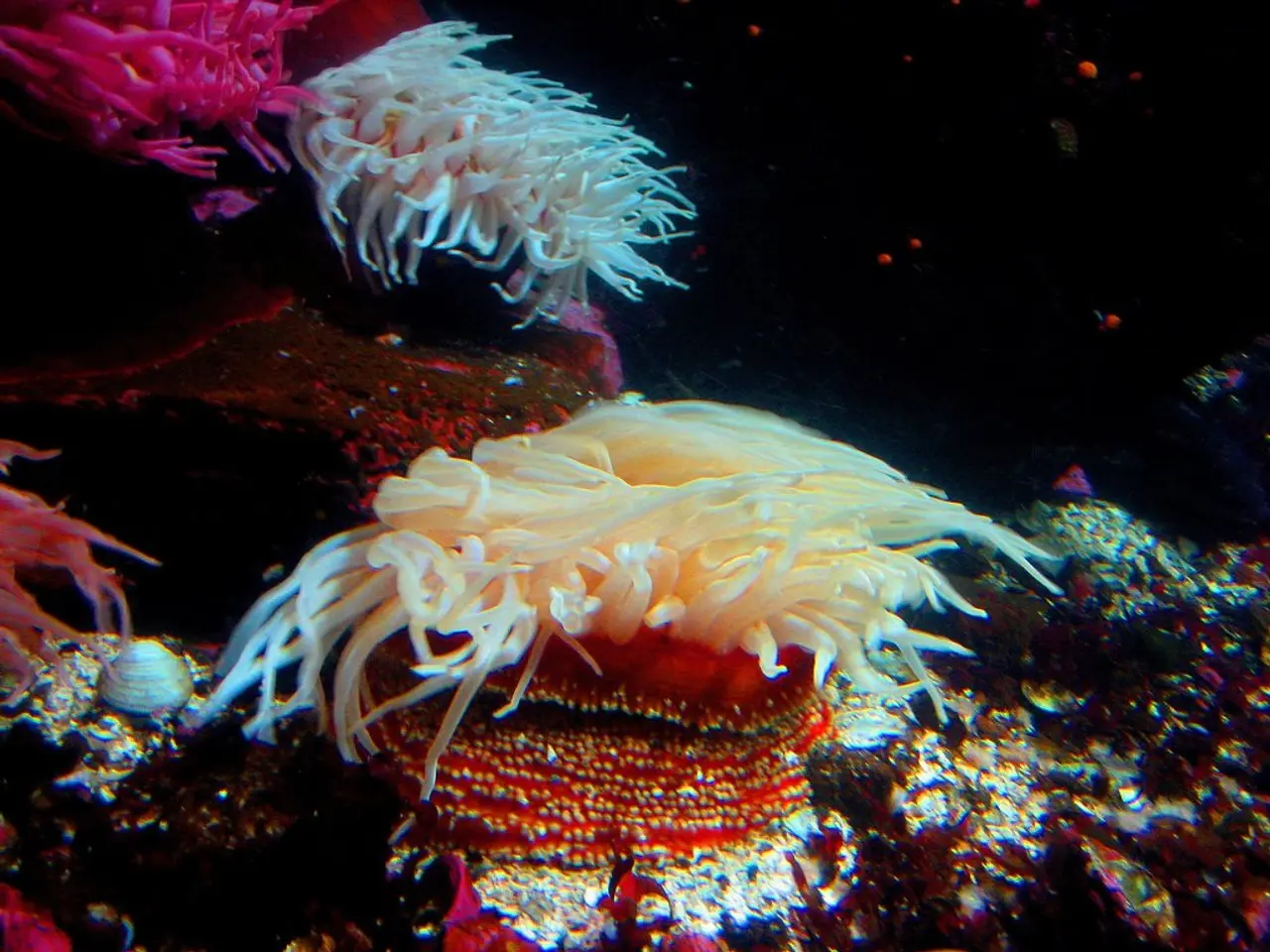Catastrophic coral bleaching, most severe in history, has struck Australia's renowned Great Barrier Reef, according to a recent report.
Global Mass Coral Bleaching Event of 2024 Causes Significant Damage to Great Barrier Reef
A recent report urges more research into reef adaptation and protection as the world works to reduce greenhouse gas emissions, following the devastating impact of the 2024 global mass coral bleaching event. This event, primarily caused by an extreme marine heatwave driven by climate change, affected coral reefs worldwide, including the Great Barrier Reef off the coast of Australia.
The Great Barrier Reef, the world's largest coral reef, experienced the largest decline of coral on record in 2024 during this global mass bleaching event. The coral cover dropped significantly, with the southern reefs seeing a decrease from 38.9% to 26.9%, and the northern and central regions also experiencing sharp declines. Approximately three-quarters of surveyed reefs showed bleaching, with 40% of those reefs having over half of their corals completely bleached (white).
The impacts of this bleaching event were severe. Mass coral mortality occurred as bleached corals either recovered when conditions improved or died when heat stress persisted too long. The loss of coral cover led to a diminished reef structure and complexity, threatening reef-dependent fish and marine species, and risking local extinctions and ecosystem collapse.
The Great Barrier Reef is home to over 1,500 species of fish and 411 species of hard corals. The degradation of the reef has far-reaching consequences, not only for the marine life that depends on it but also for coastal communities. Reefs provide vital protection for coastlines, reducing the impact of floods, cyclones, and sea level rise.
The event also increased the reef's volatility, with the reef showing more frequent and intense bleaching events since 2016, including consecutive years in 2024 and 2025. This signifies reduced reef resilience and recovery capacity. Additionally, degraded reefs become susceptible to algae and seaweed overgrowth, further altering reef ecosystems long-term.
The Queensland Conservation Council called on state and national leaders to reduce emissions and shut down coal power stations in response to the event. The report warns that the Great Barrier Reef may reach a point from which it cannot recover, emphasising the urgent need for greenhouse gas emissions reductions and improved reef management and restoration efforts to help coral reefs adapt to ongoing climate change impacts.
The Ningaloo Reef off the western coast of Australia also experienced bleaching during this period, but the impacts have not been fully measured yet. The loss across the 2,300-kilometer (1,400-mile) ecosystem of the Great Barrier Reef is especially discouraging after it experienced significant growth in the last few years.
The ocean is storing 90% of the excess heat from global warming, and each of the last eight years has set a new record for the amount of heat stored in the ocean. The massive loss of coral cover across the Great Barrier Reef is a stark reminder of the devastating effects of climate change on our planet's marine ecosystems and the urgent need for action.
[1] Australian Institute of Marine Science (AIMS). (2024). Great Barrier Reef 2024 Bleaching Event. Retrieved from https://www.aims.gov.au/research/coral-reef-bleaching-2024
[2] Queensland Conservation Council. (2024). Great Barrier Reef Bleaching: Urgent Action Needed. Retrieved from https://www.qldconservationcouncil.org.au/great-barrier-reef-bleaching-urgent-action-needed
[3] United Nations Environment Programme. (2024). Coral Reefs Under Threat: The Role of Climate Change. Retrieved from https://www.unep.org/resourceefficiency/issues/coral-reefs-under-threat-role-climate-change
[4] CNN. (2025). Widespread Bleaching on Ningaloo Reef. Retrieved from https://www.cnn.com/world/article/ningaloo-reef-bleaching-australia-intl-hnk/index.html
[5] CNN. (2024). Widespread Bleaching on Great Barrier Reef. Retrieved from https://www.cnn.com/world/article/great-barrier-reef-bleaching-australia-intl-hnk/index.html
[1] The alarming decline of the Great Barrier Reef, a UNESCO World Heritage site, during the 2024 global mass coral bleaching event, has highlighted the importance of investigating environmental science and health-and-wellness solutions to preserve and restore the ecosystem.
[2] The consequences of climate change and its impact on marine ecosystems such as coral reefs necessitate immediate action from policymakers and researchers alike. With national and international reports emphasizing the urgent need for emissions reduction and improved management strategies, it is crucial that research in science, particularly in the field of reef adaptation and protection, receives increased funding and support.




